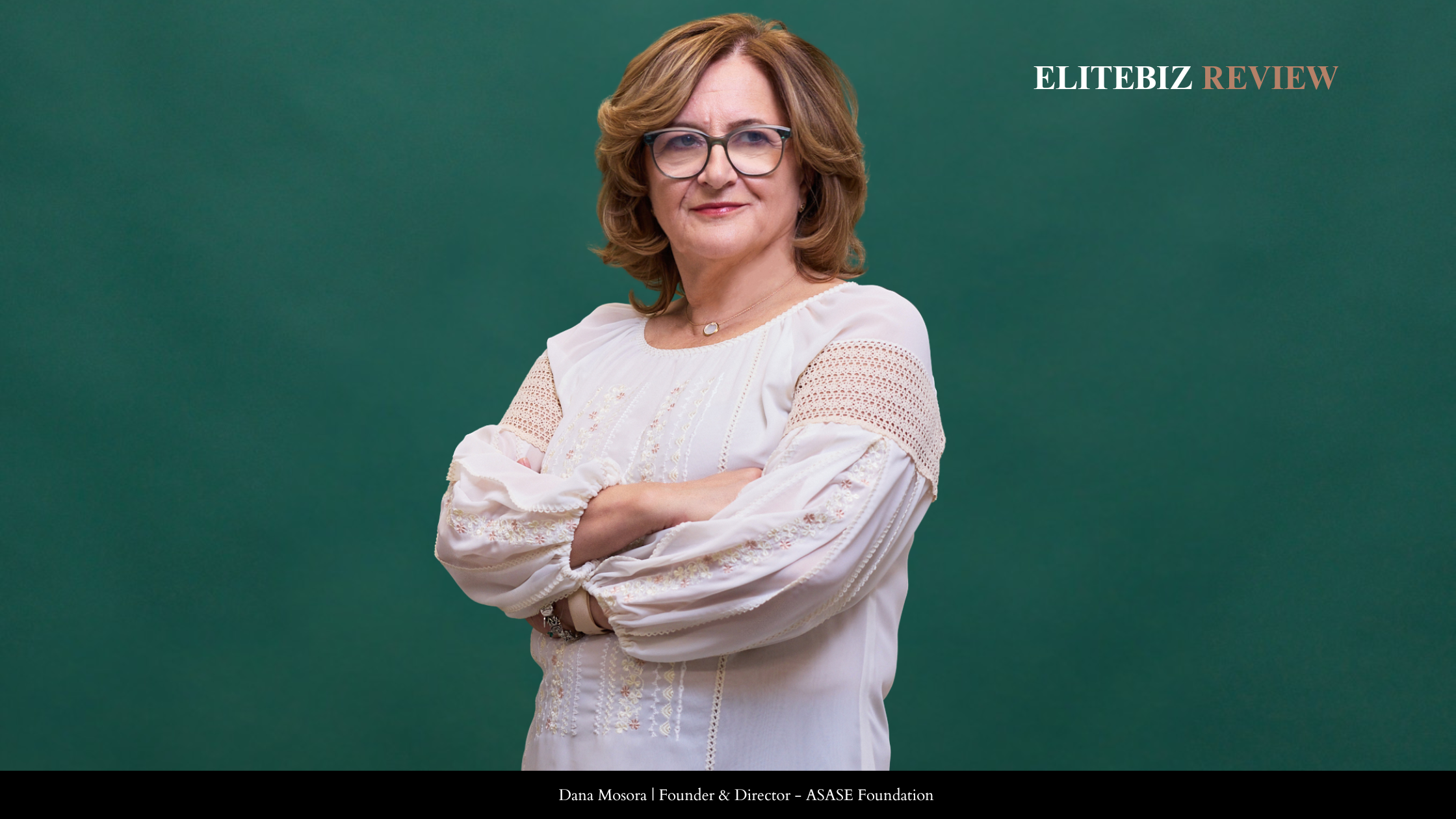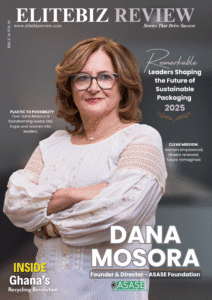In an era where the conversation around sustainability often revolves around policy debates, corporate pledges, and technological breakthroughs, there remain stories of individuals who take a deeply personal journey to transform communities. One such story belongs to Dana Mosora, Founder and Director of the ASASE Foundation. Her work in Ghana is a testament to how vision, resilience, and community empowerment can redefine the future of plastic waste management while uplifting women and families in underserved regions.
A Journey from Corporate Boardrooms to Community Streets
Dana Mosora’s story begins far from Accra’s bustling markets or Kumasi’s neighborhoods. As a chemical engineer, she built her career with multinational companies like Colgate Palmolive, Sara Lee, and Dow Chemical. These roles afforded her global exposure, continuous personal growth, and the opportunity to learn from remarkable colleagues. Over the years, she gathered not just technical expertise, but a deep appreciation for how collective knowledge and mentorship shape a professional journey.
Yet, as retirement approached, she found herself reflecting on the wealth of experiences she had accumulated. “I always felt that people with whom I worked and, from whom I learned so much through the years, left each their own mark and somehow made me a better and more accomplished professional,” Mosora recalls. With this realization came the desire to give back—to redirect her skills and energy towards a mission beyond corporate success.
Her answer came during work travels in Africa, where she witnessed firsthand the pervasive absence of plastic waste management systems. The sight of discarded packaging flooding streets and waterways revealed a challenge she could no longer ignore. What began as a retirement hobby soon evolved into a life mission. Drawing inspiration from the resilience of women in African communities—women she observed leading families and villages with unmatched determination—Mosora envisioned an initiative that would tackle plastic waste while empowering women.
With some of her early retirement funds and a $100,000 grant from the Dow Impact Fund, she established the ASASE Foundation in Accra, Ghana. The first imperfect but symbolic step was building a recycling plant for discarded water sachets—ubiquitous in Ghana’s communities yet devastating to the environment. This first step, though small, laid the foundation for what would grow into a model of hope for communities across the country.
The Core Mission: Turning Waste into Value
At its heart, the ASASE Foundation exists to demonstrate that community-driven solutions can tackle plastic waste while creating livelihoods. Its mission is clear: build and manage community-based recycling operations, empower women to lead them, and ultimately transfer ownership to local employees.
The focus is on water sachets—small plastic packets of drinking water that dominate the Ghanaian market. While affordable, they contribute massively to street litter and clogged drains. The Foundation diverts these sachets from becoming pollution and instead recycles them into usable plastic, creating both cleaner streets and economic value.
“We enable women to become key players in the solution,” Mosora explains. “We finance the infrastructure and manage operations until employees, majority women, are ready to take over.” The approach is holistic: job creation, skill development, community empowerment, and environmental restoration all converge.
Today, ASASE’s operations support about 200 employees across three plants—two in Accra and one in Kumasi. The majority are women, who not only earn secure incomes but also gain leadership experience. In every sense, the Foundation embodies a model where waste becomes worth, and marginalized communities transform into pioneers of circular economy practices.
One concrete materialization of the value created for the community is the conversion plant in Weija Gwabe, Accra , still in pilot phase, where plastic waste is transformed in plastic lumber used by local artisans to build outdoor furniture and school benches.
Confronting the Obstacles in Sustainable Packaging
To understand the urgency behind ASASE’s mission, one must consider the larger picture of sustainable packaging. For decades, the packaging industry innovated with a focus on performance, convenience, and cost efficiency. This resulted in increasingly complex packaging: multilayer composites of plastics, metals, and paper designed to maximize function—but virtually impossible to recycle.
“It became really sophisticated without any consideration of the end of life,” Mosora observes. The consequence? Plastic packaging waste that accumulates globally, especially in regions with little to no waste infrastructure.
The path forward, according to Mosora, requires bold redesign. Packaging must be simplified and built for recyclability. Innovations are underway, but economic barriers remain—chiefly the high cost of recycled plastic compared to virgin materials. Legislative interventions, like Europe’s Packaging and Packaging Waste Regulation, which mandates recycled content and recyclability at scale, are vital levers for change. However, in the Global South, where 80% of plastic packaging ends up as litter due to absent systems, the issue is even more urgent.
Here, the challenge is twofold: building basic waste management infrastructure and financing it. While organizations like the Alliance to End Plastic Waste support many projects with the aim to create a systemic change, Mosora emphasizes that systemic solutions require much larger investments and new innovative financial support solutions. Without bold leadership, the cycle of waste and pollution persists.
Advancing Circular Economy Practices in the Global South
The ASASE Foundation serves as a living model of circular economy in action. By embedding recycling within communities, the Foundation ensures that value created from waste remains local. “It’s about cashing-in the plastic waste of the community for the benefit of the community,” says Mosora.
In practice, this means plastic sachets collected from streets are processed into recycled materials, which can then be sold or repurposed. Local people gain jobs, new skills, and stable incomes. More importantly, women are positioned as leaders of these enterprises, ensuring that benefits ripple through families and villages.
The operations in Tema West and Weija Gwabe, Accra, and more recently opened in Juaben, Kumasi illustrate this principle. Streets are cleaner, households benefit from additional income, and communities take pride in owning solutions to their waste problems. For the Global South, where large-scale centralized systems may be unrealistic, ASASE’s decentralized, women-led model offers a scalable and replicable approach.
Beyond its immediate impact, the Foundation’s work serves as a demonstration model for other regions grappling with similar challenges. If communities across West Africa—and eventually the Global South—could adopt this approach, it would represent a fundamental shift in how plastic waste is addressed.
The ASASE Foundation managed to construct such a demonstration project for the Global South thanks to partnership and grand based financing from the Alliance to End Plastic Waste and the European Union as a public-private partnership.
Today the Foundation benefits from an innovative financing tool, the outcome based bonds issued by World Bank in collaboration with CITI Bank as commercial partner. The value of the loan received as bonds, is being paid back by the plastic credits generated by ASASE’s operations and sold by its intermediary, The Plastic Collective.
Inspiration in Everyday Innovation
For all her focus on systemic change, Mosora also finds inspiration in simple, human-scale innovations. One example she admires is the rise of reusable water bottles. “It intrigues me by its simplicity, and the impact it has on our way to drink water,” she says. It’s a reminder that meaningful progress doesn’t always demand high-tech inventions; sometimes it requires shifting habits, supported by awareness of their positive impact.
This perspective underscores ASASE’s philosophy: empower people to adopt practices that create visible improvements, and momentum will follow. For example, a small behavioral change like choosing reusable containers can trigger broader cultural shifts in how societies perceive consumption and waste.
Balancing Business Impact with Social and Environmental Change
One of the most important lessons Mosora has learned is that sustainability cannot survive without financial viability. “Environmental and social change can be meaningful only when done in the context of a business-like initiative,” she explains. Grants and philanthropy may help launch projects, but without a sustainable business model, long-term impact falters.
In waste management, this balance is particularly challenging. Globally, systems rely on subsidies—local government funds for collection or producer responsibility fees that finance recycling. In the Global South, such mechanisms are often absent. ASASE navigates this gap through what Mosora calls “patient capital”—investment that accepts slower returns in order to sustain operations while impact grows.
This approach highlights an important point for leaders in sustainability: impact must be paired with resilience. An organization must survive financially in order to deliver benefits consistently. ASASE’s story demonstrates how combining social purpose with a business mindset is not only possible but necessary for enduring change.
The Power of Collaboration
If financial sustainability is one pillar, collaboration is the other. ASASE’s success depends on partnerships across governments, corporations, and communities. Local governments contribute in-kind support, such as land for recycling operations. Corporations provide grants or concessional loans tied to impact milestones. Communities themselves co-design projects to ensure inclusivity and ownership.
“Our ability to partner with the right parties is what will keep us successful,” Mosora emphasizes. Collaboration ensures not only resources but also legitimacy and resilience. The involvement of stakeholders strengthens the Foundation’s credibility and ensures that projects remain rooted in the realities of local contexts.
Looking Ahead: The Future of Packaging and Circular Economy
The next decade promises profound transformation in packaging. Mosora foresees a future where circular economy principles dominate. Europe, already advancing through legislation, is setting the pace, with Asia and North America following. Within 10 years, sustainable packaging will mean not just recyclability but circularity—products designed for reuse, recycling, and minimal environmental impact.
For the Global South, progress hinges on creating infrastructure and financing mechanisms. Without them, innovations risk bypassing regions most vulnerable to waste pollution. The risk of being left behind is significant, and addressing this requires urgent collaboration between governments, businesses, and NGOs to close the gap.
Advice for Leaders: Start with the Business Case
For leaders seeking to drive sustainability, Mosora’s advice is pragmatic: “Start with the business case in mind and make it financially sustainable.” Goodwill alone cannot sustain transformative projects; they must stand on solid financial foundations to endure challenges and expand impact.
This advice resonates strongly in today’s climate where many organizations make pledges but struggle to integrate sustainability into viable business strategies. By focusing on the financial core, leaders ensure that their projects have the staying power to deliver results long after the initial enthusiasm fades.
A Legacy in the Making
When asked about her long-term vision, Mosora is candid about both her aspirations and her anxieties. She dreams of a future where Ghana no longer struggles with plastic waste, where ASASE’s model has expanded across West Africa, and where the leaders trained within her organization carry forward the mission.
“Resilience in all we do will help us get to a place where we will be able to look back and say: Plastic waste in Ghana is not a problem anymore,” she reflects. It’s a vision of a legacy not defined by individual accomplishment, but by collective transformation.
Her legacy will not be measured by a single plant or project, but by the ripple effect of empowerment: women becoming leaders, communities reclaiming their streets, and future generations inheriting cleaner, healthier environments.

